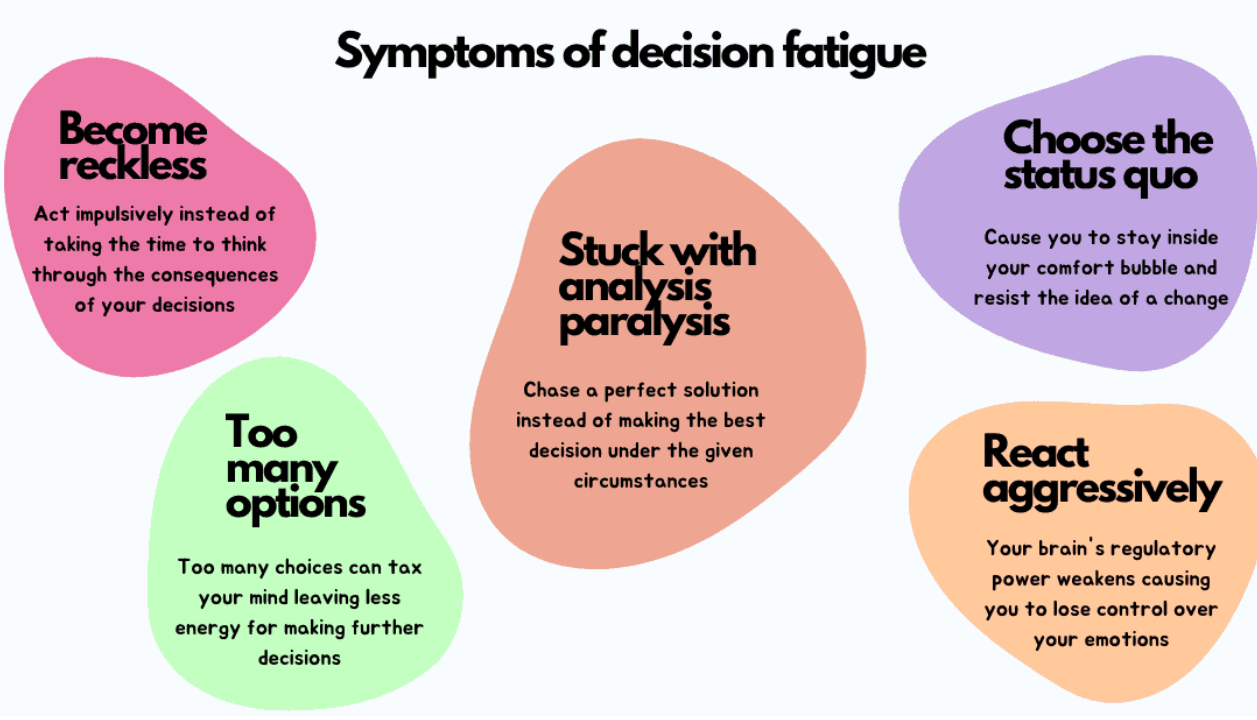Decision Fatigue: 5 Tips to Reclaim Your Energy
Decision fatigue: Have you every found yourself losing your mind because of how unnecessarily complicated life has become? Complexity stress is everywhere! The following are some complexities that stress me out (anxiety or anger provoking). Feel free to insert your own personal vexations.
|
As usual, I blame technology for everything. I am proud of the fact that I am a Gen Xer. I am part of the last generation that grew up without a computer or smart phone. We had a landline phone and an answering machine. We learned multiplication tables and how to handwrite – in cursive! |
We were taught how to have face to face conversations with others instead of texting symbols and emojis from a digital hiding place.
We read maps.
Our parents made us play outside after school – we got bloody and dirt stained. Dealing with a bully meant having a fistfight (not condoning fighting, but one is allowed to defend oneself).
And then the zombie apocalypse arrived.
Complexity stress has been fueled by corporations that leverage our laziness. We are now inundated by electronics and “advancements” such as computers in refrigerators (I just need a cold storage place for food, thank you very much). I don’t need electronics listening to me or talking to me. There is such a thing as too much.
Hanging out with friends has been relegated to social media communities that can consist of thousands of “friends” who don’t even know us. We complicate our lives (torture ourselves) by worrying what they have to say and the number of thumbs up our pages or comments receive.
Let’s not forget the eighteen thousand passwords we must create in order to just pay bills online or purchase clothing. Speaking of clothing, my head almost exploded the other day when I got new socks which were labelled “left” and “right.” Yes, they now make socks for our left feet and socks for our right. I wear them in reverse just to get back at the system. For the record, I see no difference whatsoever.
My favorite is trying to pay for an item at the checkout counter and being asked for my name, email, phone number, home address, and date of birth. They forgot blood type. I miss the days of having to answer to “cash or credit?”
We must now keystroke our way through multiple screens and digital offerings just to watch a TV show.
Whether we like it or not, this new world is here to stay – if not becoming more complicated. This leads to an increase in complexity stress. The good news is we can fight back.
At the risk of sounding defeatist, I can’t change the world or its appliances, but I can change my reaction to life and in turn improve upon my life – as can you.
I have learned to limit my exposure or completely sever my ties to such things as social media and news outlets. News complicates our lives because the media inject fear, uncertainty, and doubt (FUD) and just stir shit up. If you must watch the news, limit it to once a week and draw your own conclusions. For me, I cut it out completely. If the news is bad enough, I’ll find out without even trying – when I am pumping gas! Don’t you just love the TV monitors spitting info at you while filling up the car??
I also buy the most basic of appliances. They are cheaper and have fewer bells and whistles that can break. I surround myself with people (real people) who are critical thinkers and can have an intelligent conversation. My wife and I have one car – a basic car.
I shut off the computer and phones at a certain time and give myself time to read a book. A real paper book.
I limit the availability of my personal information.
This may sound extreme, but I try to eat the same exact foods during the week. This eliminates added complexity and conditions my body for an easily calibrated stream of healthy nutrition (I eat whatever I want on weekends).
This works for me. But the key is limitation – shave off the excess and bring stability and simplicity to your life. And for heaven’s sake, don’t buy “left” and “right” socks. ~Ted
Decision Fatigue: 5 Tips to Reclaim Your Energy ~parts adapted via Techtello.com
1. Decision Fatigue: Be An Essentialist
We make a large number of decisions from the time we wake up – some consciously, others unconsciously, some trivial, others significant, some reversible, others irreversible.
Without controlling the number of decisions we make by choice and dedicating our peak mental energy to those significant decisions that impact our lives in a huge way, we may end up with poor judgment.
The way of the Essentialist means living by design, not by default. Instead of making choices reactively, the Essentialist deliberately distinguishes the vital few from the trivial many, eliminates the nonessentials, and then removes obstacles so the essential things have clear, smooth passage. In other words, Essentialism is a disciplined, systematic approach for determining where our highest point of contribution lies, then making execution of those things almost effortless
The first step to combat decision fatigue is to organize your life in a way that you prioritize what needs prioritizing and put all your energy into getting it right.
2. Decision Fatigue: Get things out of your head
Identify activities that align with your goals and values and say no to all inconsequential activities. Then spend dedicated time daily to plan what you wish to achieve each day. Planning upfront has two major advantages:
By not spending mental cycles in deciding every instant on what to do next, you can avoid decision fatigue and free up more resources to do the real work. It will also help you attend to those urgent situations which are not under your control with the right state of mind.
Putting this practice into action requires creating visuals for complex ideas. This is one way to maximize limited energy resources. Another way involves reducing the load on the prefrontal cortex whenever possible. The idea is to get the concepts out of your mind and into the world and to save the stage for the most important functions. Minimize energy usage to maximize performance.
|
3. Decision Fatigue: Eat That Frog Tackle your most challenging task first, one that demands your mental capacity to process information at its best. The stage uses up power quickly, and as the lights dim, it gets harder to hold actors in the right place and stop others from getting on the stage. This tendency means scheduling the most attention-rich tasks when you have a fresh and alert mind. |
This could be early in the morning, or perhaps after a break or exercise. Making a tough decision might take thirty seconds when you are fresh and be impossible when you’re not.
By prioritizing work that will have the greatest positive impact on your life and matching the mental demands of the work with your energy levels, you will be able to make the best decisions when you are not under the effect of decision fatigue.
What do you do when things don’t pan out the way you wanted?
4. Decision Fatigue: Believe You Have More Willpower
As much as we crave an organized world and like to be in control, things don’t always go according to a plan.
You may be forced to make a decision when you are tired. What should you do then – say no to making a decision? Well, sometimes that may not be a possibility.
Stanford University Professor of Psychology Carol Dweck found “that while decision fatigue does occur, it primarily affects those who believe that willpower runs out quickly.” She states that “people get fatigued or depleted after a taxing task only when they believe that willpower is a limited resource, but not when they believe it’s not so limited”. She notes that “in some cases, the people who believe that willpower is not so limited actually perform better after a taxing task
This does not mean that you will never feel decision fatigue if you keep making one decision after another. Rather, it guides you to believe in a growth mindset and exercise your willpower when put under tough situations, when you have to make a decision even though your mental resources have depleted.
By exercising your willpower in such moments, you may not make the best decision, but it will be much better than the one without it.
5. Decision Fatigue: Know When It's Time To Stop
The best decision makers are the ones who know when not to trust themselves. Even the wisest people won’t make good choices when they’re not rested and their glucose is low. That’s why the truly wise don’t restructure the company at 4 p.m. They don’t make major commitments during the cocktail hour. If a decision must be made late in the day, they know not to do it on an empty stomach.
Know when it’s time for you to stop – take feedback from your past decisions, identify patterns based on your best and worst decisions and incorporate it into your planning.
By knowing when you operate well and when you are physically present but mentally absent, you can make a choice to opt-out of the decision process and push those decisions to a later stage.
Be the master of your own life. Don’t let it run on autopilot by learning to make a few decisions and make them well by being an essentialist, getting things out of your head, eating that frog, exercising your willpower and opting out when you aren’t adding value.

